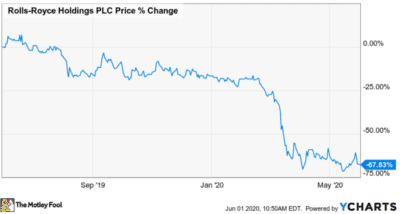The Rolls-Royce (LSE:RR) share price has decreased dramatically since the start of the Covid-19 crisis. But is the worst already behind for the company?
Share price fall
The share price plunge has been dramatic. The value of Rolls-Royce stock has fallen by two thirds, below 300p per share.

As you can see from the graph, most of the damage was due to the coronavirus pandemic that started in March. However, unlike many other companies, Rolls-Royce’s stock hasn’t recovered any of the losses since.
As we all know, Rolls-Royce is a large engine producer. The company’s customers include industrial firms and nuclear power plants. Many orders are due to defence but the greatest number of customers are from the civil aerospace sector. The aerospace division is so important for the company that 47% of its employees work there. Due to the pandemic, aerospace industry activity fell to levels unseen before. So, many of the company’s customers were lost.
Rolls-Royce’s fundamentals
That is why credit rating agency S&P downgraded the company’s credit rating to junk status on 28 May. Two other investment agencies – Moody’s and Fitch – did not change their credit ratings of the company. However, it is likely that they will follow S&P’s example. If that happens, Rolls-Royce’s borrowing costs will rise.
On a more positive note, Rolls-Royce’s other customers are getting on somewhat better. According to the company’s report, defense activity is in line with the management’s expectations. Still, the power systems department is experiencing some problems due to a slight drop in demand from oil and gas customers.
Fortunately, Rolls-Royce has a substantial cash cushion and much of its debt is not maturing any time soon. The company’s current cash level amounts to £5.2bn. Rolls-Royce expects its liquidity to total £6.7bn due to additional borrowing. Even though it will have a bad effect on its balance sheet, it will allow the company to avoid bankruptcy for some time. The only debt maturing in the near term is a £500m bond. The repayment is due in the second half of 2020 and the company has enough cash to repay it.
Rolls-Royce is also decreasing labour costs to improve efficiency. Quite recently the company announced that it would cut 9,000 jobs in its civil aerospace wing. Sadly, it will make many people unemployed. The company’s current shareholders are in an unpleasant situation as well. Apart from the dramatic share price plunge and plenty of uncertainty ahead, they will not get a dividend this year. All these measures, however, will allow the company to spare some cash.
Here’s what I’d do now
I totally agree with my colleague Kirsteen Mackay that Rolls-Royce is not a perfect stock for novice investors. It carries substantial risks. Even though the global economy is starting to open up, the aerospace industry will probably take a lot more time to recover. This means that Rolls-Royce shares will stay depressed for some time.
Overall, I think that there are many other options for FTSE 100 investors.






